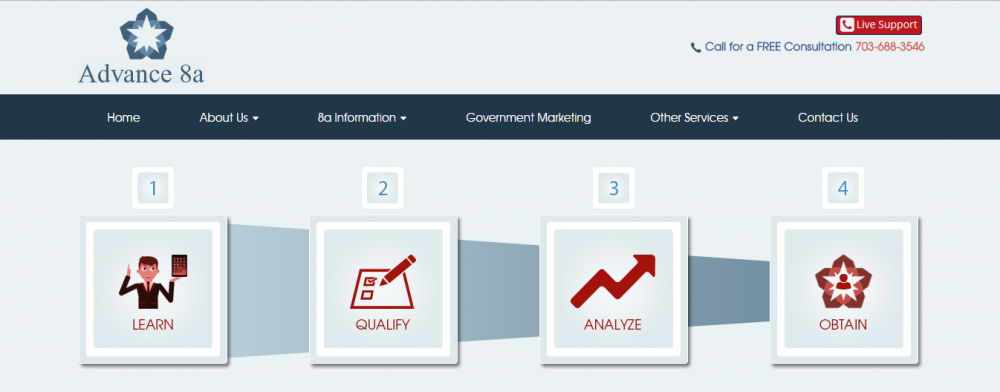Ever heard of an 8a business and wondered what wizardry it entails? Well, it is not magic, but it sure can work wonders for your entrepreneurial journey.
An 8a business is a special designation given by the U.S. Small Business Administration (SBA) to small businesses that are owned and controlled at least 51% by socially and economically disadvantaged individuals. This program is a beacon of hope, aiming to level the playing field for businesses that might otherwise be overshadowed.

The Origins of the 8a Business Program
The 8a Business Development Program, often just called “8a,” has its roots in the civil rights movement, born out of a desire to ensure equal opportunities for all. It is named after Section 8(a) of the Small Business Act, a piece of legislation that sought to encourage a diverse and inclusive economy. Fast forward to today, and the program stands as a testament to the ongoing commitment to this cause.
Key Benefits of Being an 8a Certified Business
- Access to Government Contracts: One of the crown jewels of the 8a program is the exclusive access it provides to government contracts. These aren’t just any contracts; they’re set-aside specifically for 8a businesses, reducing competition and opening doors to significant revenue streams.
- Business Development Assistance: Think of the 8a program as your business’s personal trainer, offering coaching, guidance, and support to help you grow stronger and more competitive. This assistance is invaluable for navigating the often-turbulent waters of entrepreneurship.
- Networking Opportunities: Being an 8a business throws you into a vibrant community of like-minded entrepreneurs. The networking opportunities are golden, offering a chance to learn, collaborate, and grow together.
Eligibility Criteria for 8a Certification
- Ownership Requirements
To join the 8a family, your business must be majority-owned (at least 51%) by individuals who meet the SBA’s criteria for social and economic disadvantage. - Social and Economic Disadvantage
This isn’t just about ticking boxes. The SBA requires proof of disadvantage, whether it’s due to racial, ethnic, cultural bias, or economic hardship, ensuring that the program reaches those it’s intended to help. - Potential for Success
Your business also needs to show potential for success. This means having a solid business plan, the ability to perform on contracts, and a track record (or at least the promise) of financial stability.
The Application Process for 8a Certification
1) Required Documentation
Ready to dive in? Brace yourself for a paperwork adventure. The application process is thorough, requiring everything from financial statements to personal narratives.
2) The Review Process
Once submitted, your application will undergo a rigorous review process. This isn’t just about dotting i’s and crossing t’s; it’s a deep dive into your business’s eligibility and potential.
Success Stories: Transformations Through 8a Certification across the nation, countless businesses have flourished thanks to the 8a program. These success stories are not just inspiring; they’re a testament to what’s possible when opportunity meets preparation.
Challenges and Considerations
The journey to becoming an 8a certified business, while promising, is fraught with challenges that demand attention and perseverance. The application process itself is intricate, requiring meticulous documentation and a deep understanding of the criteria for social and economic disadvantage. Beyond the initial certification, businesses must continuously navigate the complexities of compliance, adapting to evolving regulations and maintaining the standards set by the program.
This ongoing commitment underscores the importance of not only achieving 8a status but sustaining it through strategic planning and operational excellence. The path to leveraging the benefits of the 8a program is thus marked by both significant opportunities and stringent requirements, highlighting the need for thorough preparation and resilience in the face of regulatory and operational challenges.
How to Leverage Your 8a Status for Maximum Impact?
a) Strategic Planning and Goal Setting
With great power comes great responsibility. Leveraging your 8a status means setting strategic goals and planning meticulously to achieve them.
b) Continuous Learning and Adaptation
The business world is ever-changing, and staying ahead means being a lifelong learner. Embrace continuous improvement, and your 8a status will be a catalyst for growth, not just a badge of honor.
The Concluding Thoughts
Embarking on the 8a journey can indeed transform your entrepreneurial path. It’s a unique opportunity to leverage government resources, gain valuable insights, and connect with a supportive community. While the road may have its challenges, the destination—a thriving, competitive business—makes the journey worthwhile.

